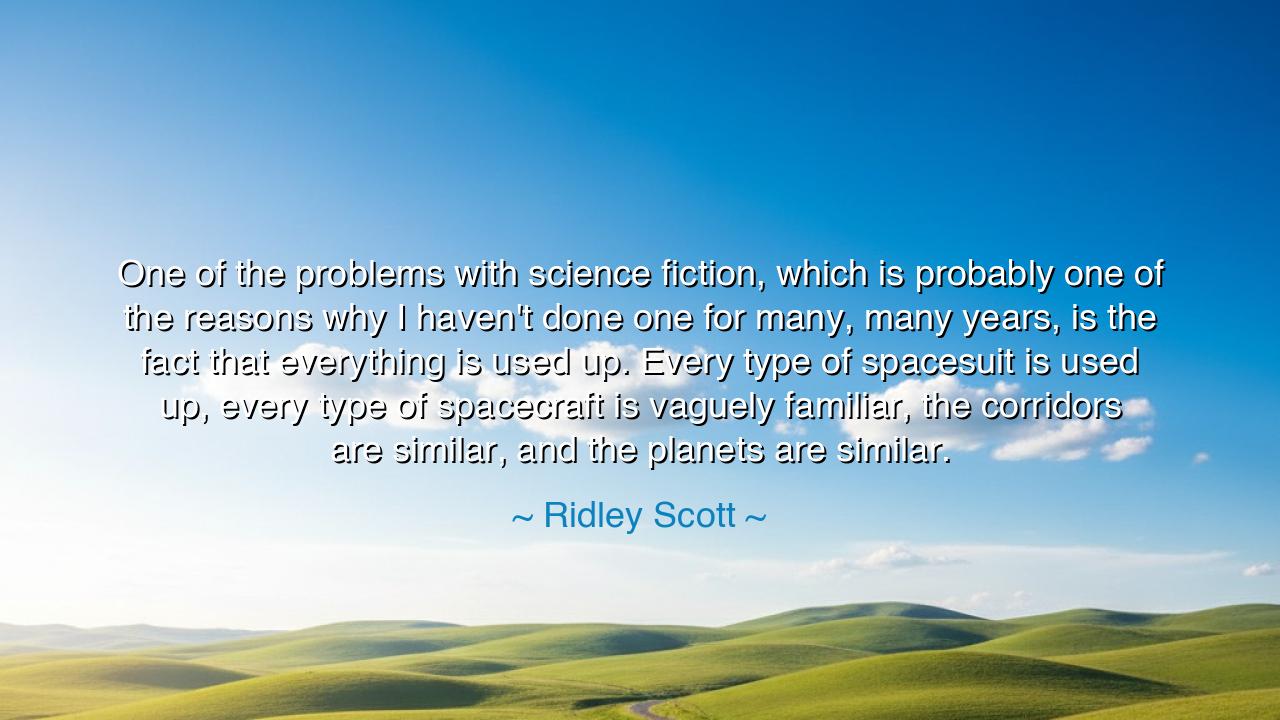
One of the problems with science fiction, which is probably one
One of the problems with science fiction, which is probably one of the reasons why I haven't done one for many, many years, is the fact that everything is used up. Every type of spacesuit is used up, every type of spacecraft is vaguely familiar, the corridors are similar, and the planets are similar.






Hear the voice of Ridley Scott, master craftsman of vision and architect of alien worlds, who spoke with weary candor: “One of the problems with science fiction, which is probably one of the reasons why I haven’t done one for many, many years, is the fact that everything is used up. Every type of spacesuit is used up, every type of spacecraft is vaguely familiar, the corridors are similar, and the planets are similar.” These are not the words of a man disenchanted with wonder, but of one who knows too well the burden of repetition, and the yearning for freshness in a field grown crowded with echoes.
The meaning of his words is plain yet profound. In the realm of science fiction, imagination is the oxygen, the very life-blood. Yet Scott laments how often imagination grows stale, how the same spacesuits, the same spacecraft, the same corridors and planets are endlessly recycled, until mystery is dulled and novelty is exhausted. When visions are no longer strange, the future no longer feels vast; when worlds are too familiar, they cease to inspire. His lament is a call for renewal—for the courage to move beyond the expected and to seek visions untainted by overuse.
The ancients also warned of this danger: the dulling of the spirit when wonder is lost. In the story of Odysseus, the hero sails past lands of endless feasting and repetition, yet it is not these familiar shores that shape him—it is the strange, the unknown, the uncharted. Likewise, in art, if we dwell too long on what is already seen, we cease to journey. Scott, who once birthed visions like Alien and Blade Runner, reminds us that to make true science fiction is to dare into realms that feel genuinely new, where awe and terror walk hand in hand.
History offers us another example in the age of exploration. When maps of the world were filled with blank spaces, men like Magellan and Columbus set sail into mystery, their voyages sparking imagination as much as conquest. Yet once the maps were filled, once every coastline had been charted, the thrill of discovery seemed diminished. So too in Scott’s lament: when every cinematic corridor looks the same, when every planet mirrors another, the audience feels the map of wonder already drawn, leaving little to surprise them.
The lesson here is one that extends far beyond film. Every field of human endeavor faces the temptation of repetition—of imitating what has succeeded, of settling into familiar forms rather than daring something untried. But it is precisely in breaking those forms, in inventing new paths, that greatness is born. The artist, the thinker, the dreamer must resist the safety of imitation and instead strive to recover the mystery that makes creation alive.
Practical action follows: in your own work, whether it be art, study, or daily labor, do not settle only for what has already been done. Ask yourself: Am I merely repeating the corridors of others, or am I building something new? Seek inspiration not from what is endlessly recycled, but from the raw, unshaped unknown—your own ideas, your own daring, your own questions that no one has yet answered. In this way, you may find your own “science fiction,” a vision not exhausted by use, but renewed by boldness.
So let Ridley Scott’s words echo as both lament and challenge. Science fiction may sometimes feel “used up,” but only because men settle for imitation instead of exploration. The true artist, the true dreamer, must step beyond the familiar spacesuit, the predictable spacecraft, the recycled corridor, and venture once more into the undiscovered. For the universe of imagination is still infinite, waiting for those with courage enough to map it anew.






AAdministratorAdministrator
Welcome, honored guests. Please leave a comment, we will respond soon